22,111 Israeli military aircraft have violated Lebanese airspace over the last 15 years. Their buzz, roaring and exploding sounds form the background of daily life in Lebanon, enveloping the country in “atmospheric violence.”
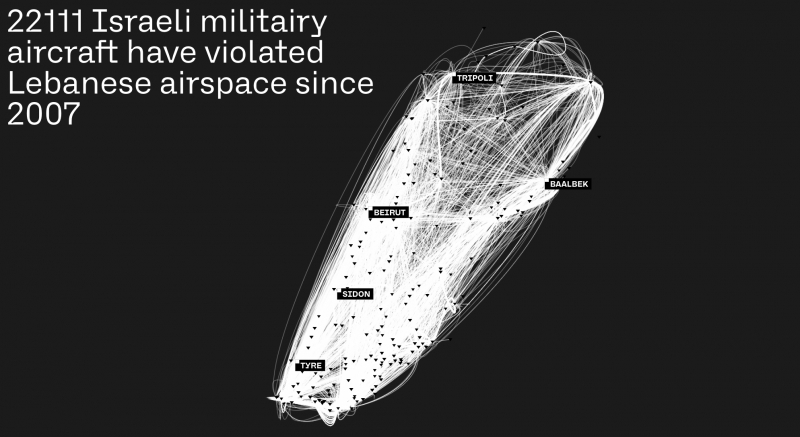
Lawrence Abu Hamdan, Air Pressure (A diary of the sky), 2022
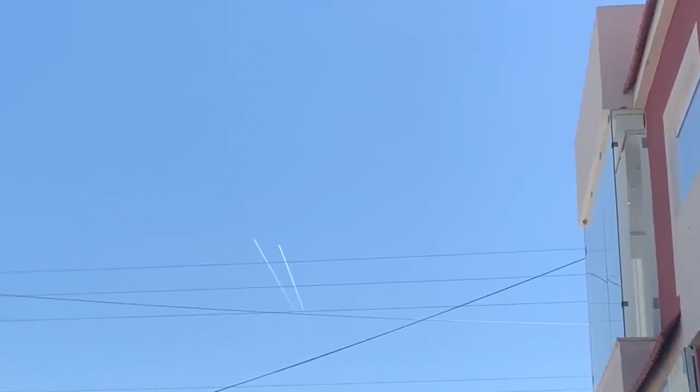
Lawrence Abu Hamdan, Air Pressure (A diary of the sky), 2022. Israeli planes in the skies of Lebanon
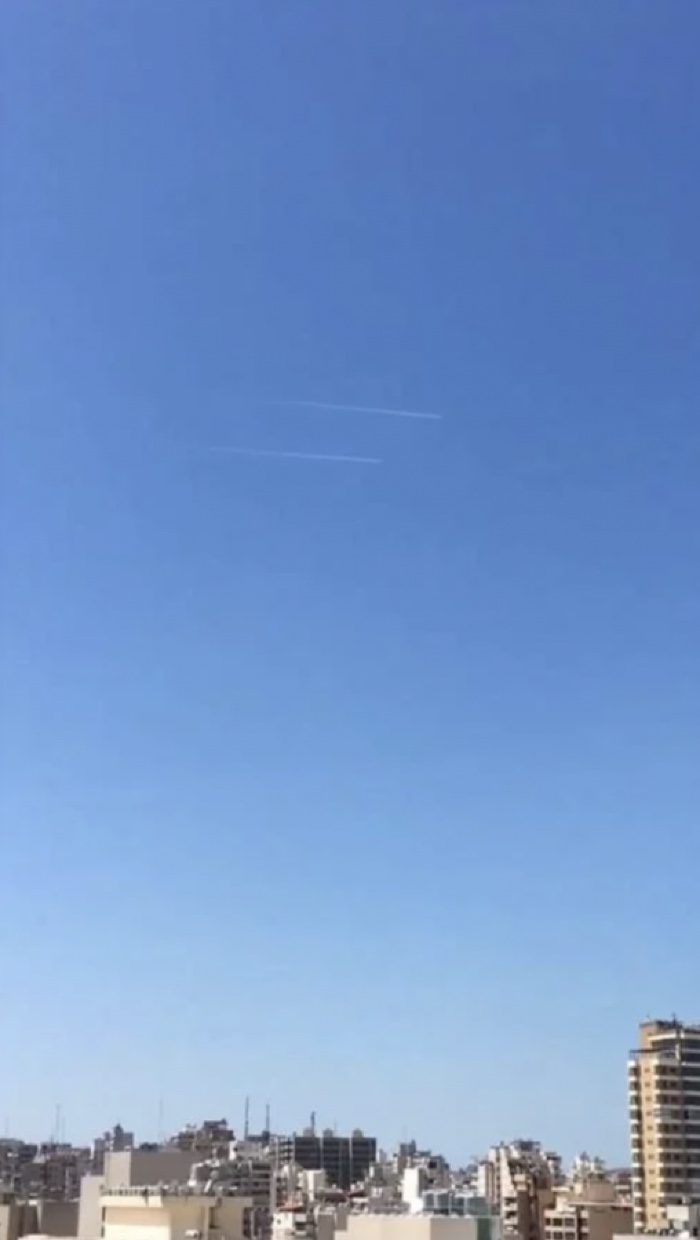
Lawrence Abu Hamdan, Air Pressure (A diary of the sky), 2022. Israeli planes in the skies of Lebanon
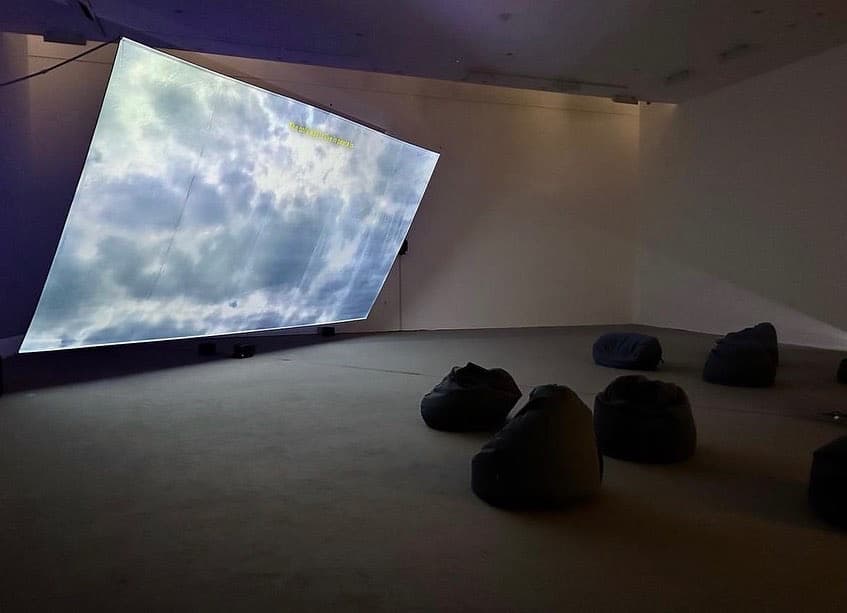
Lawrence Abu Hamdan, Air Pressure (A Diary of The Sky), 2022. Exhibition view, Fondazione Rebaudengo
The flights of these UAVs, fighter jets, drones, helicopters and other aircraft are carried out in violation of the UN Security Resolution 1701, which was formulated in 2006 at the end of the conflict between Israel and Lebanon known in Lebanon as the July War.
For two years, Lawrence Abu Hamdan gathered and analysed documents reporting the Israeli illegal aerial invasions of Lebanon. Abu Hamdan, an artist who defines himself as a “private ear”, is concerned with the “politics of listening,” using surveillance technologies, sound recordings and archival materials to investigate how sound is used to silence, oppress, discriminate and heal. The documents he collected consisted in 243 letters dating from 2006 to 2021 and addressed to the UN Security Council by the permanent representative of Lebanon. Archived in the United Nations Digital Library System, they include the information detected by radars, such as the time, duration, type and trajectory of each air violation.
Compiling the data was a challenge: “The documents had been uploaded in an unsystematic way, located disparately on the website. The team behind AirPressure.info had to patch all of these documents together and manually transcribe each violation in order to make these numbers accessible and readable,” Abu Hamdan explained. “The Lebanese Ministry of Defense, the UN Security Council and the UN Interim Force in Lebanon monitored and recorded these violations and had clear access and ability to do this work themselves. Instead, by storing the data in a piecemeal and uncoordinated fashion, these institutions have contributed to masking the extent of these crimes.”
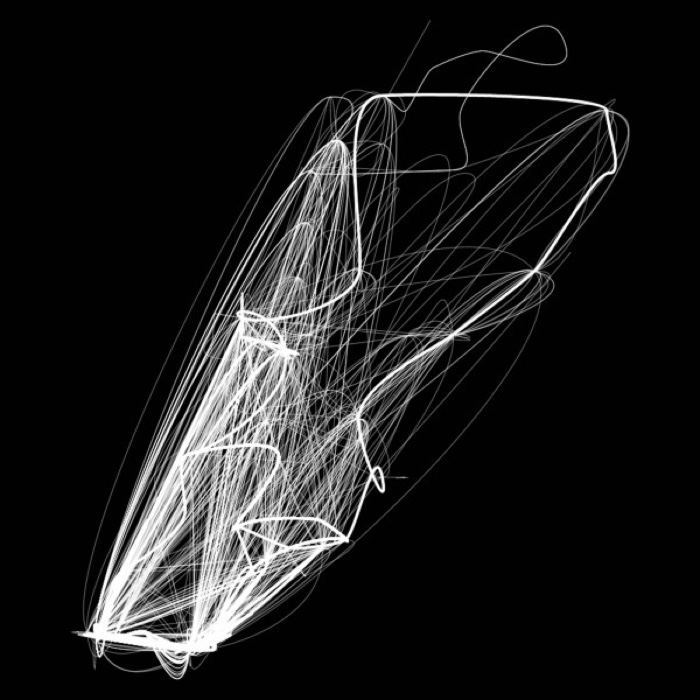
Lawrence Abu Hamdan, Air Pressure (A diary of the sky), 2022
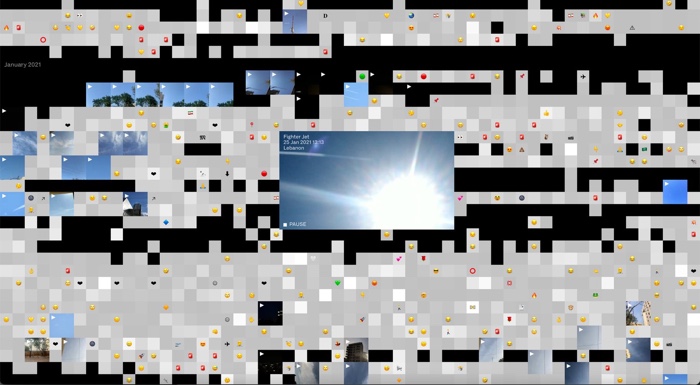
Lawrence Abu Hamdan, Air Pressure (A diary of the sky), 2022
The artist mapped, analysed and shared on AirPressure.info the data about the 22,111 flights that have invaded the Lebanese skies over the past 15 years. The website also presents the recordings he made on the ground as well as crowd-sourced real-time footage. Before Abu Hamdan, no one -not even journalists, the Lebanese government or the UN- had ever documented the illegal flyovers.
The documentation thus assembled feeds the video installation Air Pressure (A Diary of the sky) currently on view at Fondazione Rebaudengo in Turin. The video focuses on a one-year period, from May 2020 to May 2021, linking data from flight records, the investigation process that the artist undertook in the same period and crowdsourced footage.
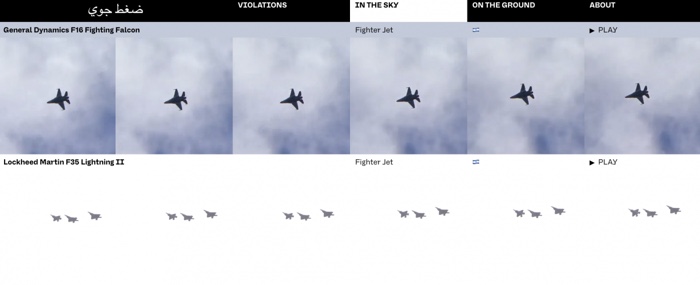
Lawrence Abu Hamdan, Air Pressure (A diary of the sky), 2022
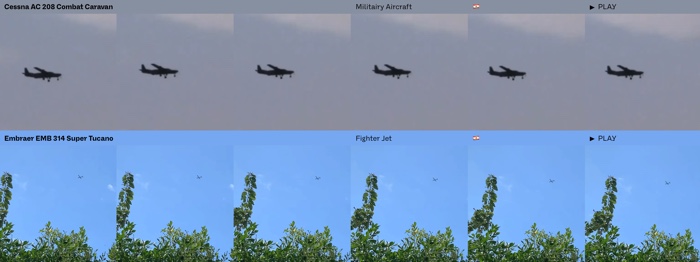
Lawrence Abu Hamdan, Air Pressure (A diary of the sky), 2022
The video also reveals how the accumulation of these short-lived atmospheric moments of violence acts one long assault of noise, violence and oppression that takes its toll over time. These noisy illegal flyovers, averaging around four and a half hours per day, leave the Lebanese in a perpetual state of psychological distress and uncertainty. This sound “that we tend to ignore, forgetting that it is lethal,” according to Abu Hamdan, produces acoustic frequencies that are physically and psychologically aggressive. On the website, a list of peer-reviewed papers from academic journals exposes the impacts that the noise generated by aircraft has on human physiology. The chronic stress caused by the flights is linked to increased occurrences of high blood pressure and heart disease for some people.
A close observation of the data led to several significant observations. First of all, the overflights cover the whole Lebanese territory, contrary to the narrative that limits Israeli interest to areas associated with the presence of Hezbollah, the Lebanese Shia Islamist political and paramilitary group. Secondly, the data collected shows only two incidents of fighter jets entering through the Lebanese border and exiting into Syrian territory, contrary to the misconception that most of these flights were en route to bomb Syria. Both findings refute the Israeli discourse that Hezbollah is its sole target, they also challenge the myth of resistance as advocated by Hezbollah which has had more than 22,000 opportunities at least to prove itself.
Finally, most of these operations involve some of the most technically advanced fighter jets or surveillance aircraft in the world, against which the basic Lebanese ground defences are no match. This shows that the operations are on the side of mass surveillance and intimidation. It was quite upsetting to hear the narrator in the video explain that the sky invasion by Israel had briefly paused in March 2021, but only because the military aircraft were busy bombing Gaza.
Air Pressure (A diary of the sky) develops a compelling narration of the concept of atmospheric violence, offering a historical and political reflection on the use of noise as a tool for oppression and control.
Lawrence Abu Hamdan, Air Pressure (A diary of the sky), curated by Irene Calderoni and Amanda Sroka, is at Fondazione Re Rebaudengo in Turin until 26 February 2023.
Other entries about Lawrence Abu Hamdan’s work: Walled Unwalled. The politics and violence of acoustics, Art in the Age of Anxiety and INFORMATION (Today): Data diktats and human complacency.
Related stories: Big Eye Kabul. Surveillance blimps over Afghanistan, The System of Systems: technology and bureaucracy in the asylum-seeking process in Europe, The Drone Chronicles 2001-2016, Book review: Drone. Remote Control Warfare, Tanks, drones, rockets and other sound machines. An interview with Nik Nowak, A screaming comes across the sky. Drones, mass surveillance and invisible wars, Book review: A Theory of the Drone, Drones, pirates, everyday racism. An interview with graphic designer Ruben Pater, Eyes from a distance. Personal encounters with military drones, The Sounds of Absence and narco-violence, etc.
